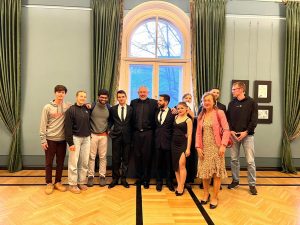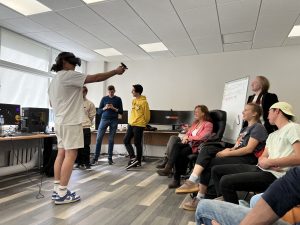Can you combine the sustainability topic, learning new languages and change of perspective on Europe? Participation in the Erasmus+ Blended Intensive programme (BIP) “Green cities” did just that: students from three ECIU member universities worked together online and onsite in Kaunas, to improve their German language skills and brainstorm ideas on how to make our cities green.
The course content was co-created by teachers from Kaunas University of Technology, INSA Toulouse and University of Twente, under the ECIU University micro-module “Green cities”. Besides new language and a very relevant topic, the experience of various cultures and employment of different perspectives were the aspects that made an impact on all participants, students and teachers likewise.

Hemanthkumar Sureshkumar, a student at the University of Twente from India, said that participation in this programme allowed putting himself in a different role: “The workshops of the module made me push myself into new experiences and try to implement new personality traits. It also provided me valuable insight into the leadership change, the concept that I work on in the honours programme at my university”.
Austėja Slavykaite, a student at the Kaunas University of Technology, was happy to meet people from different cultures.
“It was my first experience in an international project. Generally – an interesting experience, especially meeting people from different cultures. I learned a lot from my teammates,” said Austėja, who participated in the Erasmus+ programme during her first year of bachelor studies.
Jurgita Lukienė, a teacher at the KTU, emphasized the role of the programme in deepening language competencies in a unique way.
“Students came together not only from different countries but also from different cultures. They discussed the relevant topics, such as making our cities more sustainable, and, in doing so, they improved their language and intercultural skills. For students who visited Kaunas, we even had a crash course on Lithuanian,” said Lukienė.

Students worked together with teachers and coaches for eight weeks online. The last week culminated in the physical meeting in Kaunas, where the closing workshops, meetings and cultural activities took place. Mobility week was funded by Erasmus+ in the frame of a Blended Intensive Programme.
Katja Auffret, a teacher from INSA Toulouse, and one of the main organisers of the visit explained: “We wanted the students to apply the concepts they had developed about Green Cities to a specific city, in this case – Kaunas. As it is difficult to develop real intercultural relationships online, the students had an opportunity to meet offline to discuss their work further and participate in intercultural group work”.
One of the participants, Mano Schrowange, a student from INSA Toulouse, singled out the importance of mobility.
“I joined a very diverse group: students gathered from different universities, cultures, study fields and even study levels. Meeting physically definitely has big advantages: you can build relations, read the body language and experience full conversation dynamics. It is hard to get to know people in zoom meetings,” said Mano.
Ann Collet from Germany, currently studying at the University of Twente, admitted the visit to Kaunas changed their perspective on diversity in Europe: “The experience in Lithuania gave me a new appreciation for the role of Europe across different countries and cultures. My idea of Europe now is much more inclusive of the diversity within the EU. With the electric buses and modern trains, the clean parks, rich history, diverse cultural sights, and kind, multilingual citizens, Lithuania showed me that it has much to offer, and the quality of life is comparable to western Europe.”
They believe that the opportunity to tackle intercultural competencies might be very useful not only for international students but also for local students, and help the integration of local and foreign students’ communities.
Teacher, Arnold Enklaar from the University of Twente was involved in assigning mixed groups of students to work online on projects. He believes that this kind of international collaboration has an impact on the awareness of cultural differences. He believes that working together in person for at least ten hours a day creates strong bonding between teachers and students, and boosts learning effects.
“By meeting each other in person in Kaunas I was better able to assess whether meeting and discussing in person would have a stronger effect. It did. Visiting Kaunas also made it possible for participants to get in touch with Lithuanian history and culture,” says the teacher.
ECIU connects innovative universities across thirteen EU countries. Students from ECIU members are welcome to explore and join ECIU University challenges and micro-modules.